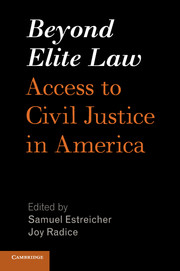Book contents
- Frontmatter
- Contents
- Beyond Elite Law
- Foreword
- List of Contributors
- Overview
- Overview
- PART I CURRENT STATE OF ACCESS TO LEGAL SERVICES
- PART II SOURCES OF LEGAL SERVICES ASSISTANCE FOR WORKING AMERICANS
- PART III FASHIONING A REFORM AGENDA
- PART IV CREATING A CULTURE OF SERVICE
- 43 Integrating Pro Bono with the Law Firm's Business
- 44 Facilitating Law Firm Pro Bono in Transactional Cases
- 45 What Bar Associations Can Do to Improve Access to Civil Justice
- 46 The Teaching Law Office: Service and Learning in the Law School Years
- 47 The Emergency-Room Law School Clinic
- 48 CUNY Law School's Community-Based and Community-Empowering Clinics
- 49 A New Law School in Texas to Address Unmet Legal Needs
- 50 Public Service Residency in Lieu of the Third Year of Law School
- Index
48 - CUNY Law School's Community-Based and Community-Empowering Clinics
from PART IV - CREATING A CULTURE OF SERVICE
Published online by Cambridge University Press: 05 May 2016
- Frontmatter
- Contents
- Beyond Elite Law
- Foreword
- List of Contributors
- Overview
- Overview
- PART I CURRENT STATE OF ACCESS TO LEGAL SERVICES
- PART II SOURCES OF LEGAL SERVICES ASSISTANCE FOR WORKING AMERICANS
- PART III FASHIONING A REFORM AGENDA
- PART IV CREATING A CULTURE OF SERVICE
- 43 Integrating Pro Bono with the Law Firm's Business
- 44 Facilitating Law Firm Pro Bono in Transactional Cases
- 45 What Bar Associations Can Do to Improve Access to Civil Justice
- 46 The Teaching Law Office: Service and Learning in the Law School Years
- 47 The Emergency-Room Law School Clinic
- 48 CUNY Law School's Community-Based and Community-Empowering Clinics
- 49 A New Law School in Texas to Address Unmet Legal Needs
- 50 Public Service Residency in Lieu of the Third Year of Law School
- Index
Summary
Law school clinics can seek to integrate their pedagogical objectives with the needs of the community in which they are based. Natalie Gomez-Velez discusses the innovative clinics of this type at CUNY School of Law.
Social justice law practice requires meaningful engagement with clients and communities. For low-income and marginalized clients, the need for individual legal representation often is accompanied by multi-faceted, systemic, socio-legal issues that require attention and response if the representation is to be effective. Law schools have an important role to play in training students for holistic representation and providing tools that support not only excellent legal representation but also a range of strategies to improve access to justice to individuals and communities as part of effective practice and professional obligation.
From its inception, the City University of New York (CUNY) School of Law's mission-driven commitment to clinical legal education and social justice lawyering has included deep and broad work preparing students for community-based practice designed to address both individual and systemic social justice concerns. Contrary to recent narratives about too many lawyers and not enough legal work, CUNY Law's program has long focused on an awareness of the scarcity of available lawyers to address legal issues related to basic human needs and the impact of this gap on access to justice for all but the wealthiest individuals and communities.
CUNY Law's curriculum requires every student to engage in supervised practice in a clinic or concentration before s/he graduates. The clinics and concentrations are the culmination of the law school's integrated curriculum. The curriculum includes doctrinal courses alongside simulated practice or “lawyering” courses that are offered in the first and second years. The lawyering sequence is designed to complement and strengthen student understanding of doctrinal materials while engaging students in legal writing, research, client interviewing, counseling, negotiation, and oral advocacy.
This chapter will focus on four of the clinics: Economic Justice Project (EJP), Community Economic Development (CED), Immigrant and Non-Citizen Rights (INCR), and Elder Law, to provide examples of how the clinical model operates in various civil practice contexts.
ECONOMIC JUSTICE PROJECT
The Challenge
CUNY Law launched the EJP in 1997 in the wake of the crisis created for many students as a result of regressive welfare reform legislation.
- Type
- Chapter
- Information
- Beyond Elite LawAccess to Civil Justice in America, pp. 680 - 693Publisher: Cambridge University PressPrint publication year: 2016



